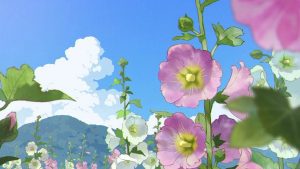 I can’t bring myself to say much about that episode, to be honest. Watching this has literally become a physically painful experience for me, no exaggeration. Every blow it strikes against the source material feels like it impacts directly on my solar plexus. There are so many ways this thing assails my sensibilities that I hardly know where to begin – so maybe it’s better if I don’t try. But maybe the most painful thing of all is the knowledge that the vast majority of people who watch the anime will never read the book, and never understand why those of us that love it do so. And why this is so hard to take.
I can’t bring myself to say much about that episode, to be honest. Watching this has literally become a physically painful experience for me, no exaggeration. Every blow it strikes against the source material feels like it impacts directly on my solar plexus. There are so many ways this thing assails my sensibilities that I hardly know where to begin – so maybe it’s better if I don’t try. But maybe the most painful thing of all is the knowledge that the vast majority of people who watch the anime will never read the book, and never understand why those of us that love it do so. And why this is so hard to take.
 Seriously – things have gotten so dreadful that Kaji Yuuki being cast as Yoshitsune barely even registers. Yoshinaka has been turned into a monkey, Yoritomo into a half-witted coward – I can’t wait to see what they do to Yoshitsune (if they bother). But one specific development that’s especially personal to me is the butchering of the Atsumori arc’s climax, one of the most famous moments in Japan’s history. That happened in my backyard, in Akashi. I passed the beach where Atsumori met his end every day on the train to work, visited the temple where his final hours are honored for posterity. And we don’t even get the name of the guy who killed him – a pivotal figure in the story, a man with complicated motivations and a full backstory? I just don’t know what to say.
Seriously – things have gotten so dreadful that Kaji Yuuki being cast as Yoshitsune barely even registers. Yoshinaka has been turned into a monkey, Yoritomo into a half-witted coward – I can’t wait to see what they do to Yoshitsune (if they bother). But one specific development that’s especially personal to me is the butchering of the Atsumori arc’s climax, one of the most famous moments in Japan’s history. That happened in my backyard, in Akashi. I passed the beach where Atsumori met his end every day on the train to work, visited the temple where his final hours are honored for posterity. And we don’t even get the name of the guy who killed him – a pivotal figure in the story, a man with complicated motivations and a full backstory? I just don’t know what to say.
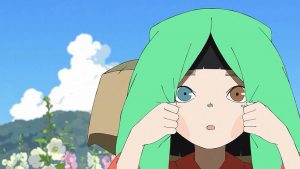 This has really reached the “why bother” stage for me. Both for myself – though having come this far, I’m forcing myself to see it through – and the production itself. If you’re not even going to try, why bother? I don’t suppose there’s a single answer to that, but I can’t imagine anyone thought this thing was going to make any money so for someone involved it had to have been a passion project. But passion for what? It can’t possibly be for Heike Monogatari, which is what makes all this so puzzling.
This has really reached the “why bother” stage for me. Both for myself – though having come this far, I’m forcing myself to see it through – and the production itself. If you’re not even going to try, why bother? I don’t suppose there’s a single answer to that, but I can’t imagine anyone thought this thing was going to make any money so for someone involved it had to have been a passion project. But passion for what? It can’t possibly be for Heike Monogatari, which is what makes all this so puzzling.
That’s all I got. I need a drink.



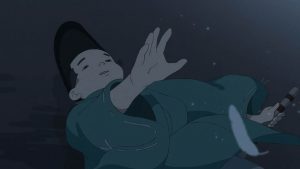
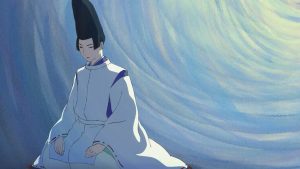
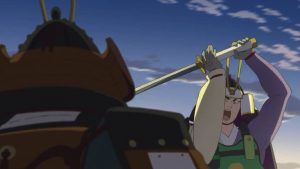

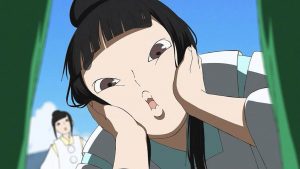
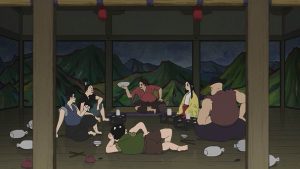

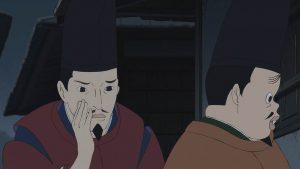

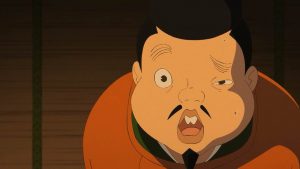
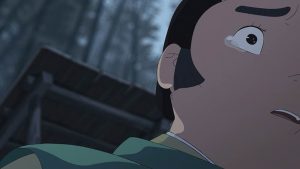
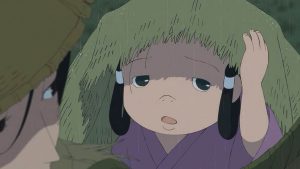

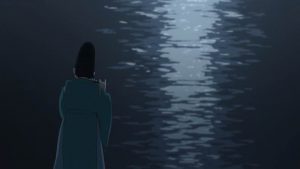
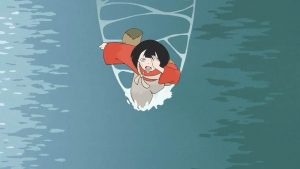



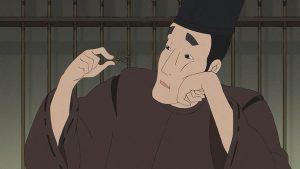


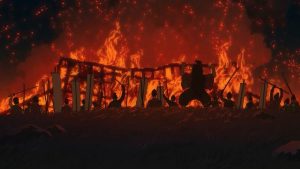
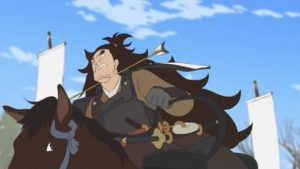
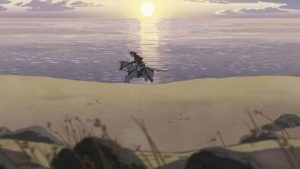

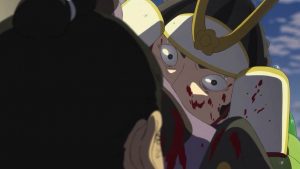
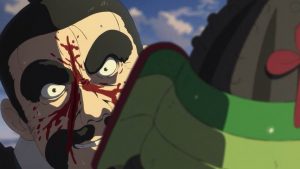
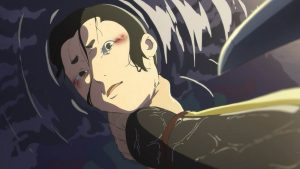
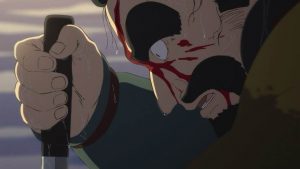






BBOvenGuy
November 12, 2021 at 4:51 amI’m sorry you’re having such a hard time. I totally get it. Adaptations of a loved source can be really hard, because the people doing the adaptation have their own agenda and their own forces acting on them. In this case, it looks like the anime’s creative team didn’t want to do a faithful adaptation as much as they wanted to use the setting as a springboard to make their own artistic statement. Happens all the time, and it can be really interesting, but it can also be painful.
If it’s any consolation, the book is likely going on my Christmas list because of how highly you value it. Feel free to suggest a favorite edition.
Guardian Enzo
November 12, 2021 at 6:45 amSadler or McCullough unless you want a really poeticized take. I’d avoid the modern one this adaptation is loosely based on.
Collectr
November 12, 2021 at 7:09 amI’m reminded of an old joke.
Patient: Doctor, it hurts when I do that.
Doctor: Don’t do that.
Seriously, you are under no obligation – to yourself or us readers – to continue blogging a show that frustrates and enrages you so much.
On a side note: it sounds like you’re not a fan of the Royall Tyler translation.
Guardian Enzo
November 12, 2021 at 7:37 amWell, that would be the “really poeticized” take. It’s well-done, but the Heike isn’t Hamlet or Homer – it’s not literally in verse even if it descends from verbal storytellers. To me there are passages where Tyler forcing that onto the test seems just that, forced.
Kim
November 12, 2021 at 12:03 pmI watched the first two episodes and I couldn’t get into it so I am thrilled it’s not like the book. Makes me feel better that it’s not that I don’t enjoy a Japanese classic I just didn’t like a very loose adaption of it.
Guardian Enzo
November 12, 2021 at 1:16 pmBut I bet you’d enjoy the book.
GermyRTZ
November 16, 2021 at 3:23 pmHey, for wich name can I search for the book? Or what version do you recommend.
Sincerely I’ve come from a group of spanish anime fans that found this anime really incredible, of course, for us who know just the surface of the story, the production quality and the direction is ridicolously good.
Buy I really want to read the source material, so I can understand a little bit how you feel, and because just from the anime, this story seems like a really great piece of cultural art.
Guardian Enzo
November 16, 2021 at 3:32 pmHey there. I’m going to assume you mean in English – I’m sure there are Spanish translations but I honestly have no idea about those. As far as I’m aware any online bookseller should simply have it iisted as “Heike Monogatari”. Failing that you can search for “The Tale of the Heike”.
Among the English ones the McCullough and Sadler are both (as far as I know) still in print and very faithful to the source material. I would personally try one of those. A newer translation by Royall Tyler is readily available too and some like it, but the issue I have is that he basically tells the story in Homeric verse (which is not how it was originally told).
GermyRTZ
November 16, 2021 at 3:39 pmThx, I will search for it, I’m really immersed in the story so soon or later I will get the book 🙂
Guardian Enzo
November 16, 2021 at 7:27 pmPlease, please do. The anime utterly fails (though to be fair it isn’t really trying) to do it justice.
MajorTom
November 18, 2021 at 1:36 amThe only widely available resource about this in my country is Eiji Yoshikawa version. Have you read his version? What do you think of it? I’ve been thinking to buy it for quite sometime.
The best part of following thru this series is to read your take after each episodes (other than the music or biwa pieces). Thank you for taking your time to write these review. Because eventho I’m not familiar with the source material, I couldn’t feel attached to the series at all. I could only imagine if they do this to Sengoku period material I would feel annoyed just like you. (I grow with the book Taiko and love it so much)
Guardian Enzo
November 18, 2021 at 6:38 amThanks – I think it’s good that discussion of the Heike has been prompted by the anime, if nothing else.
There are a couple of issues with the Yoshikawa version, the first being that he died before he finished it. Also, in his own words it was “modified” for Western audiences. I’d view it less as a translation of the Heike and more as a (partial) novelization of it. I’d read it if it was all I could find, but it wouldn’t be my first choice.
anastasiya
July 12, 2023 at 6:33 pmi was only passingly familiar with the original story, having read carl sagan’s cosmos as a kid. apparently the heike crabs in that region have carapaces that resemble human faces? there’s an accompanying legend that they’re the reincarnated souls of the taira clan. he recounts the end of ‘heike monogatari’ for his readers as context, and offers a hypothesis that the unique shape of their shells is due to artificial selection. the sad tale piqued my interest, but not enough to shake the hold modern japan’s history had on me until recently.
so many years later, i decided to make some headway on my giant ‘plan-to-watch’ list and just finished this series today. it strikes me as a mood piece or a tone poem rather than an attempt at absolute fidelity to its source material; maybe that’s not a bad thing. it seems rare to me to find female directors who are interested in lavish, extended depictions of combat, and war histories can be a bit dry… it felt like the creators were working from that assumption here. i’m also a fan of centering women more in historical tales.
i appreciated yamada’s emphasis on the humanity of the taira in the 11 episodes the studio set aside for this series, myself. we see how kiyomori’s vindictive spirit endangers and eventually dooms his whole clan to extinction from inside its plushly insulated walls; they (with few exceptions) remain somewhat ignorant of their effect on those they’ve ruled to the bitter end. i pitied their suffering AND decried the cruelty that led them there. is not the original tale at least in part about appreciating such dualities?
this is a taste, and for me it was delicious; i’m sorry you found it unpalatable — your opinions are always such a joy to read, even if i disagree. (i often don’t.) i didn’t mind the narrowed focus, was on board with biwa as a symbol of story by the end… and will definitely seek out the original.